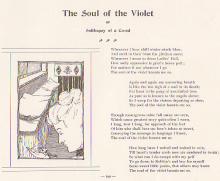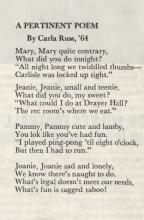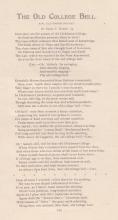Note to Professors: Never Flunk a Charming Female Student
"After the Exam" is a poem about a male student being taken by a female student's charms after class one day. On this particular day they had taken an exam and the female student tells the male one that she had flunked the exam today. The male student cannot believe what kind of Professor would "flunk such a winsome lass? Her smile would be worth an "A" to me." He further states that he would have passed her in an instant, if he were the Professor, even if she had only given him the slightest nod.





